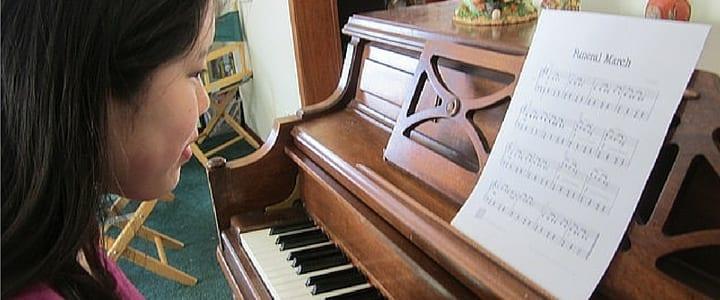Need help preparing your students for their piano exams? Learn how to set your students up for success in this guest post from our friend Darlene Irwin from The Student Music Organizer…
As piano teachers, successful exam preparation is a HUGE part of what we do. I often tell my students that passing an exam is like opening a musical door.
When your student completes an exam, they pass through that door and enter a whole new level of music.
Below are some important keys to help prepare your students for success.
1. Be Prepared: Are You Ready for the Next Level?

Don’t move forward too quickly. Students need to develop their technical facility and sight reading skills before trying an exam.
Exams aren’t for everyone. Some students enjoy doing recitals or master classes, while others prefer competitions.
The most important thing is that students learn to love music. Find out what they like. Encourage them to try many different styles of music, including duets and trios.
2. Give it Enough Time: Long-term Exam Planning is Critical

Getting ready for any practical exam takes time. Everything depends on how hard they work, how quickly they learn and how busy they are with family, school, and other activities.
Last-minute preparation leads to frustration for both the student and the teacher. Have your students learn and memorize their exam pieces early in the year and then put them away. As the exam approaches, they can revisit and continue to perfect them.
Technique, sight reading and ear training are worth quite a few marks on a practical exam. Work consistently on these areas throughout the year.
3. Take Care of Choosing Pieces: Strategic Piece Selection

Pick songs that are on the syllabus but not in the current books. My students love doing something unique.
It’s also refreshing for an examiner to hear something totally different. Choose pieces that highlight your piano student’s strengths.
Here’s a list of some of the interesting pieces that my students have worked on for exams.
- Elementary: March of the Terrible Trolls (Linda Namath)
- Early Intermediate: Land of the Silver Birch (Nancy Telfer)
- Early Intermediate: Blue Boogie (Dennis Alexander)
4. Try Memorizing in Sections: Don’t Practice Until You Get it Right, Practice Until You Can’t Get it Wrong
 Divide pieces into logical sections according to form and phrasing and label them A, B, C etc. Be sure to compare similar sections. This is especially important for a Sonatina.
Divide pieces into logical sections according to form and phrasing and label them A, B, C etc. Be sure to compare similar sections. This is especially important for a Sonatina.
It’s important to learn and memorize pieces hands separately and hands together in sections.
Your student should be able to start from any section. This gives them safely nets throughout the piece.
Tell them to keep going in a performance. Go to the next section if you must, but NEVER go back.
Practice ‘jumping’. Have your student start their piece, then call out a section. The student must jump to that section and keep going!
My theory is that there are three levels of memory:
- You can play it at home, but it’s still shaky at your lesson
- You can play it at your lesson, but it’s not ready for performance.
- You can play it for anyone anywhere at any time!
Note: You can find more helpful pedagogical blog posts on The Student Music Organizer website.

A practical piano exam is made up of many different components…. technique, studies, pieces, ear training, and sight reading. Using these keys will help your students unlock their maximum potential. Good luck preparing your students for their music exams.
 Guest Post Author: Darlene Irwin
Guest Post Author: Darlene IrwinDarlene Irwin is a registered music teacher in Ontario, Canada. She blogs about creative ways to teach music and is very successful in sharing the love of music with her students. She is also the creator of The Student Music Organizer, a super organized music dictation and resource book for students of all ages and disciplines.
Brooke Neuman

